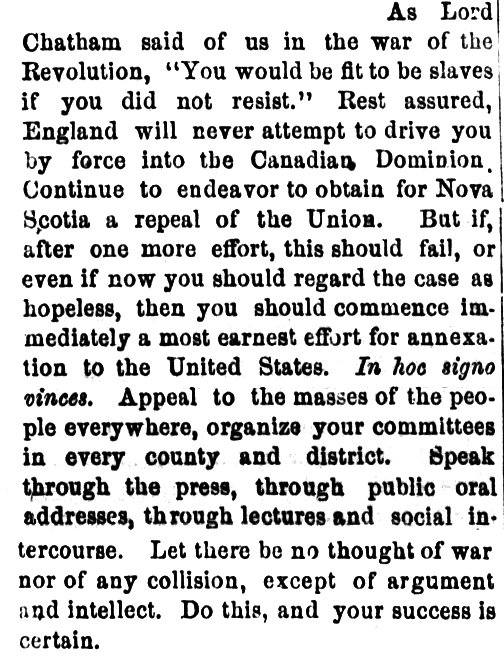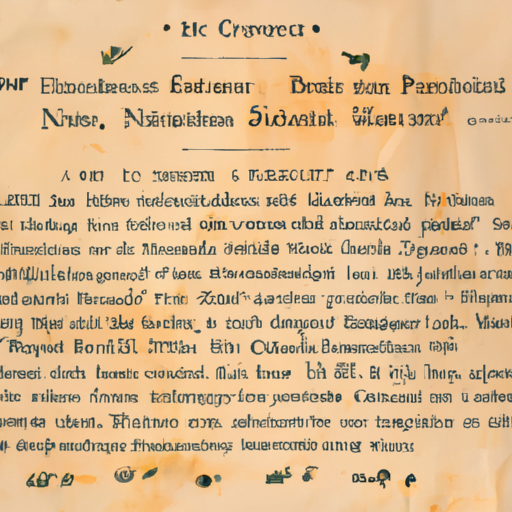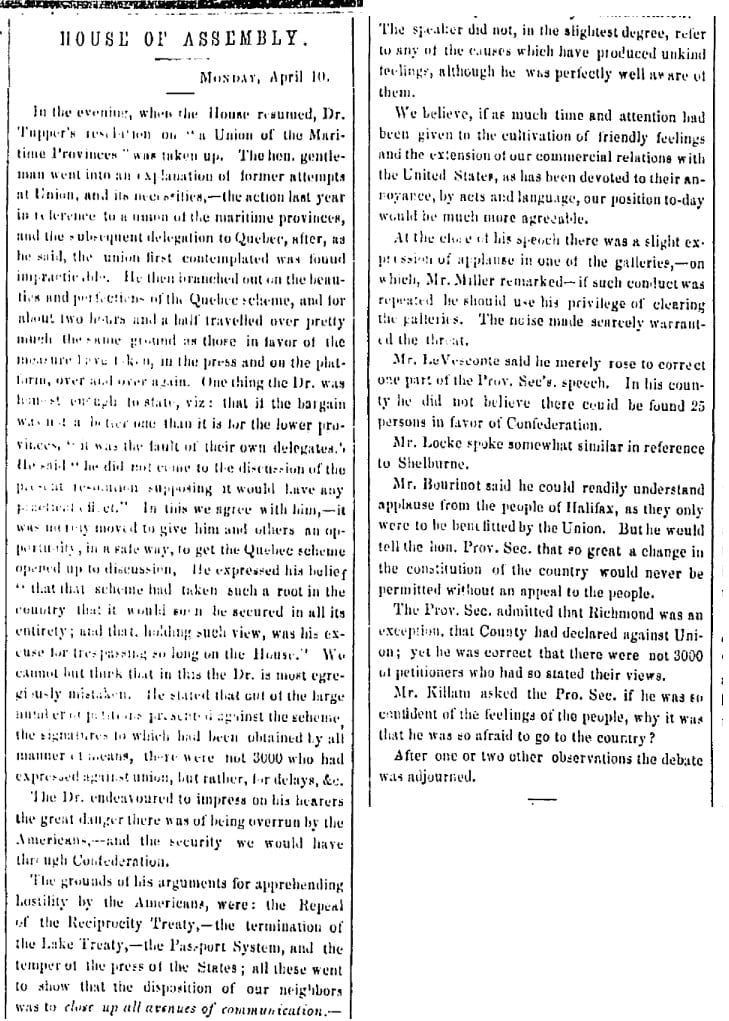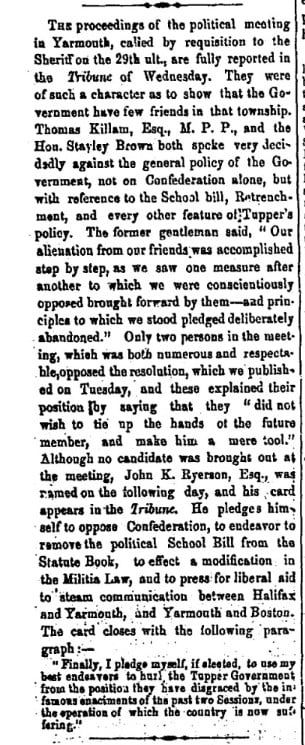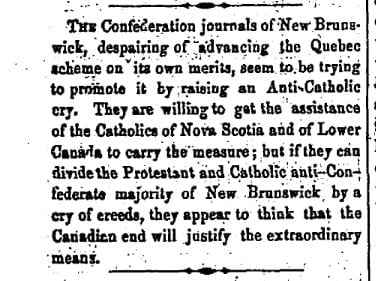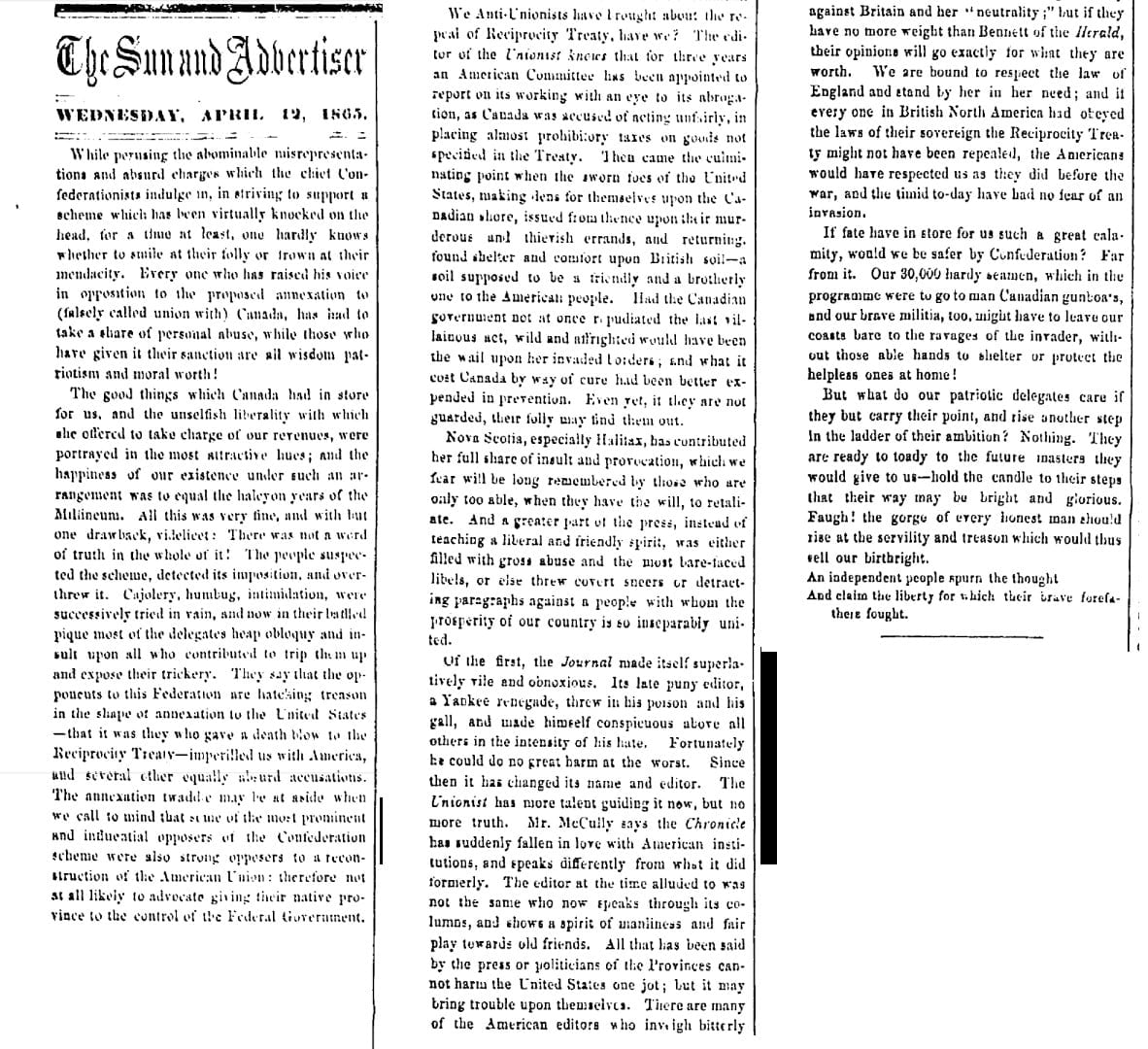RESOLUTIONS LAID ON THE TABLE OF THE HOUSE OF ASSEMBLY OF NOVA SCOTIA, BY THE HON. ATTORNEY GENERAL, ON THE 5th FEBRUARY, 1868.
- That the Members of the Legislative Assembly of this Province, elected in 1863, simply to legislate under the Colonial Constitution, had no authority to make, or consent to, any material change of such Constitution, without first submitting the same to the people at the Polls:
- That the Resolution of the 10th April, which preceded the enactment of the British North America Act, and is as follows : “Whereas, in the opinion of this House, it is desirable that a Confederation of the British North American Provinces should take place; Resolved therefore, That His Excellency the Lieutenant-Governor be authorized to appoint delegates to arrange with the Imperial Government a scheme of Union which will effectually ensure just provision for the rights and interests of this Province — each Province to have an equal voice in such delegation. Upper and Lower Canada being, for this purpose, considered as separate Provinces,” was the only authority possessed by the delegates, who procured the enactment of the “Act for the Union of Canada, Nova Scotia, and New Brunswick;
- That even if the House of Assembly had the constitutional power to authorize such delegation, which is by no means admitted, the foregoing resolution did not empower the delegates to arrange a federal union of Canada, Nova Scotia, and New Brunswick, without including, in such confederation, the Colonies of Newfoundland and Prince Edward Island;
- That no delegates from the two last named Colonies having attended, and an unequal number from each of the others being present, the delegation was not legally constituted, and had no authority to act under the said resolution — which expressly required each of the Colonies tr be represented by an equal number of delegates;
- That the delegates did not “ensure just provision for the rights and interests of this Province,” as they were, by the express terms of such resolution, bound to do, in arranging a scheme of Union, but, on the contrary, they entirely disregarded those rights and interests, and the scheme by them consented to would, if finally confirmed, deprive the people of this Province of their rights, liberty, and independence, — rob them of their revenues, — take from them the regulation of their trade, commerce, and taxes, the management of their railroads and other public properly, —expose them to arbitrary and excessive taxation, by a Legislature over which they can have no adequate control, and reduce this hitherto free, happy, and self-governed Province to the degraded condition of a dependency of Canada;
- That no fundamental or material change of the constitution of the Province can be made, in any other constitutional manner than by a statute of the Provincial Legislature, sanctioned by the people after the subject matter of the same had been referred to them at the Polls, the Legislature of a Colonial Dependency having no power or authority, implied from their relation to the people, as their legislative representatives, to overthrow the constitution under which they were elected;
- That the scheme of confederating Canada, New Brunswick, and Nora Scotia, was never submitted to the people of this Province, at the Polls, before the 18th day of September last, upwards of two and a half months after the British North America Act was, by the Queen’s Proclamation, declared to be in force, when the people were thereby informed that they had been subjected, without their consent to the absolute dominion of more populous and more powerful Colonies, and had lost their liberty;
- That there being no statute of the Provincial Legislature, confirming or ratifying the British North America Act, and the same never having been consented to, or authorized, by the people at the Polls, nor the consent of this Province in any other manner testified, the preamble of the Act. reciting that this Province had expressed a desire to be confederated with Canada and New Brunswick, is untrue ; and when the Queen and the Imperial Legislature, were led to believe that this Province had expressed such a desire, a fraud and imposition were practiced upon them :
- That the truth of the preamble of the British North America Act, reciting the desire of Nova Scotia to be Confederated, is essential to the constitutionality of the statute ; and if the same is false, the statute is defective, because a statute cannot be rendered constitutional, by falsely assuming as true the condition which is indispensable to its constitutionality;
- That from the time the scheme of Confederation was first devised in Canada, until it was consummated by the Imperial Act in London, it was systematically kept from the consideration of the people of Nova Scotia at the Polls ; and the Executive Council and Legislature, in defiance of petitions signed by many thousands of the electors of this Province, persistently and perseveringly prevented the same from being presented to the people;
- That at the recent Election, the question of Confederation, exclusively occupied the attention of the people, who were then, for the first time, enabled to express their will on a subject of the most vital importance to their happiness; and the result has proved, that this Province does not desire to be annexed to Canada, and that the people of Nova Scotia repudiate the enforced provisions of the British North America Act, which, for the reasons set forth in the foregoing Resolutions, they believe to be unconstitutional, and in no manner binding upon them;
- That the Quebec Scheme, which is embodied in the British North America Act, imprudently attempted to be forced on the people of Nova Scotia, not only without their consent, but against their will, has already created wide-spread irritation and discontent; and unless the same be withdrawn, will, we fear, be attended with the most disastrous consequence”, as the loyal people of this Province, are fully conscious of their rights as British subjects, set an inestimable value upon their free institutions, and will not willingly consent to an invasion of those rights, or to be subjected to the dominion of any other power, than their lawful and beloved Queen;
- That the Colonies were politically allied to each other, by their common relationship to the Queen and her Empire, in a more peaceable and less dangerous Connexion, than under any scheme of Colonial Confederation that could be devised, even on the fairest, wisest, and most judici9U8, principles;
- That the people of Nova Scotia do not impute to Her Majesty the Queen, and her Government, any intentional injustice, as they are well aware, that fraud and deception were practiced upon them, by those who misrepresented the public sentiment of this country’, and who, for reasons which we will not venture to assign, desired that confederation might be forced upon this Province, without the consent and against the will of the people;
- That an humble address be presented to the Queen, embodying the substance of the foregoing resolutions, informing Her Majesty, that her loyal people of Nova Scotia, do not desire to be in any manner confederated with Canada, and praying Her Majesty to revoke her Proclamation, and to cause the British North America Act to be repealed, as far as it affects the Province of Nova Scotia.
HON. ATTORNEY GENERAL’S SPEECH, ON MOVING THE REPEAL RESOLUTION IN THE HOUSE OF ASSEMBLY ON MONDAY, 10th FEBRUARY, 1868.
Hon. Attorney General addressed the House as follows: I regret proceeding to the debate on these resolutions in the absence of the hon. member for Inverness, but having been informed that lie is not likely to be in his place for some days, I find it necessary to go on with the discussion. I do so with the less regret because I know that this debate will be reported with accuracy, and that consequently that learned and honorable gentleman will be put in possession of the arguments which I and my friends on this side of the House intend to use. I am about to lay before the members of the House, before the people of this country, and probably before the people of England, the facts of one of the most important political cases that ever arose in the Colonies, and in order to do so satisfactorily, I shall endeavor to shew the true condition in which this country was placed before certain political changes took place in its constitution.
I shall endeavor in the first place to show that Nova Scotia was a well-governed and law-respecting, a contented and happy country. She was well-governed, because her institutions were constructed in miniature on the model of the British constitution, which is the finest political system by which any nation was ever governed — a system calculated to maintain order and harmony among all orders of people — a system under which obedience to law, and the necessary result of obedience to law, liberty, have been better maintained than in any other country; for, sir, however paradoxical it may seem, it is a literal truth that the highest degree of freedom consists in obedience to law. It is obedience to law which preserves to me my rights and liberties, my property and my life: and therefore, however inconsistent it may seem, it is a literal truth that the highest degree of freedom consists in obedience to law; and that country which possesses institutions calculated to produce that result in perfection must be the happiest nation on the earth. Now the constitution of Nova Scotia was based upon the principles of the British Constitution — those principles which best suit the genius of the people.
Its whole condition was different from those of any other country on the Continent of America, and the constitution which was granted to the people of this province by King George II, and which hid been enlarged and greatly improved by his successors on the throne of England, was a well-working constitution. It was as much like the British constitution as it was possible to make things which are different in their nature. There were some defects in it, among which the greatest certainly was the want of a court for the impeachment and punishment of political offenders. That was a deficiency in our system,— without it no system of Responsible Government can be perfect, and it is certainly curious, but by no means very remarkable, that the great statesmen who have originated this splendid constitution for the confederation of Canada have taken precious good care in its manufacture, — whilst they have established courts for the administration of ordinary justice, as well as courts of appeal — to leave out the court of impeachment, which, considering the nature of the men who formed that constitution, and who are likely to be instrumental in carrying it out, would be the most desirable court of all.
When we compare our constitution in Nova Scotia with that of the Great Republic, the contrast must be favorable to this province. We admire the people of that country, we have sincerely sympathized with them in their recent distress and troubles. We feel towards them all the emotions of fraternal affection, but we do not approve of their constitution. We consider that their institutions are possessed of two fatal defects — the one is democracy, the other confederation. We consider that having our little constitution moulded upon the monarchical institutions of England makes it infinitely superior to that of the United States, although the latter is a master work of human hands, and the finest piece of composition ever prepared by men for political purposes. It was manufactured by men who were really statesmen — by men who loved their country — by men who had been educated in an English school— by men who had sense enough to perceive the beauties of the British constitution — by men who endeavored with the utmost imaginable pains and skill to apply the principles of the British constitution to a democratic system and form of government; but the people of the United States were unfortunate, after having separated from England in 1783, in the political system which they instituted.
Had they combined in a legislative union — had they incorporated all the States under one Legislature, having one set of laws and revenues, they would undoubtedly, at this time, be the greatest nation upon the earth. They certainly would not have been second to any other; but, unfortunately, they chose Confederation, and that Confederation has resulted as every Confederation must result, for it is impossible so to adjust the rival and discordant interests of different countries under a confederation as to maintain permanent harmony. It is not in the nature of things that they should continue as separate and individual countries, having separate legislatures and individualities, without clashing with one another at some time or other. We have seen, notwithstanding the skill with which that famous constitution of the United States was made — notwithstanding the intelligence of that people, that great evils have made their appearance already. The Confederation was broken, an internecine civil war deluged their land with blood, and they expended in three years more than probably three times the amount of the national debt of England, in money, and the destruction of their property ; and, sir, at this moment there is no man on earth who is able to say what is to be the result of the political affairs of that great country. An earthquake is growling under their feet, and no man can tell when and where the volcano is to burst, bringing with it destruction and ruin. I make these observations with the greatest possible regret, for I believe that every man in Nova Scotia wishes well to the people of the United States, although the people of this province have no desire to be connected with them. They are too wise, too sensible to desire for a moment to part with their own well-working public institutions, and enter into union with the States.
I shall now turn your attention to another Confederation — the Confederation of Canada — and contrast it with the United States, and show you that if it be not desirable to enter into Union with the United States, Confederation with Canada is absolutely hateful and detestable to the people of this country. We object to a union with the American States, because we disapprove of Democracy and Confederation, but there is a worse political combination, that is Oligarchy and Confederation. If we dislike the constitution of the United States we are bound to hate and detest the constitution which the Confederation act has prepared for the people of these fine colonies. If we were to join the United States, Nova Scotia would possess all the freedom that every State in the Union possesses. We would have the choice of our own Governors, of our Senators, of our Legislators; we would have the power of self-taxation and self-government in the highest degree; but what would be our position if we suffered ourselves to be dragged into this hateful union with Canada, where would Nova Scotia’s freedom be?
Before the British America Act was imposed upon us Nova Scotia was as free as the air. How could the people of this country be taxed? There was no power to tax them except this House, their own servants, whom they commissioned to tax them. Is that the state of things now? Have we any power over the taxation of this country? Does not the Act in question confer upon Canada the fullest power of taxing all the property of Nova Scotia at their arbitrary will? What is our control over that Legislature? We have but a paltry voice of 19 members in the popular branch, not a single one in the other. We have, therefore, to protect the rights of this country from spoliation, only 19 members out of 253. If we should continue in Confederation we should not be governed by the people, as is the case in the United States, but by a little knot of Executive Councillors in Canada. Therefore we have no disposition to unite with one or the other — neither with the United States nor with Canada; and, sir, if we were driven to the necessity of making a choice between the two calamities, we would be bound to choose the least, and that would be, to join the United States of America, and participate in their liberty and prosperity rather than submit to the tyranny of Canada. We would have to prefer the democratic tyranny of the one country to the oligarchical tyranny of the other, and there would be no difficulty in making a choice; but thank heaven we are not called upon to choose between them. We have a constitution of our own, and that belongs to the people of Nova Scotia; and I am going to show you that the constitution they enjoy is their own property — that the Parliament of England had no power to take it away from them — that the British North America Act is entirely unconstitutional — that Nova Scotia has never been legally confederated with Canada — and it rests with her to say whether she will ever be so or not.
Before I come to look at the constitution of this country, I must make a few remarks with regard to England. We intend to send to the mother country certain gentlemen authorized to present to the Queen our humble address, praying Her Majesty to relieve us from this Confederation with Canada. We go in the most perfect confidence that our prayer will be heard. We know to whom we are going to appeal. We are not placed in the condition that the old thirteen colonies were in under King George III. We have a very different person to deal with in Queen Victoria. We have to approach ministers very different from those of the last century. We have no stubborn King George III.; we have no prejudices of the royal mind to counteract; we have not the infatuation of his ministers to meet. We have the greatest princess that ever adorned a human throne, a most virtuous Queen, who, when she accepted the sceptre, took an oath that she would rule the country according to the laws, customs and statutes of the realm. She has most nobly fulfilled her obligations, and, in answer to the prayers of her own church, ” has been most plenteously endued with heavenly gifts.” In her person she is an example of every virtue; her obedience to the laws exalts her above all other monarchs. Her personal virtues are brighter than all the gems which adorn her Imperial diadem. It is to a Queen like this that the people appeal.
Have the people no right to present themselves before their Sovereign? Has not this ever been the most loyal portion of her dominions? Did not our forefathers flee from their country because they would not participate in rebellion? Did they not leave their property for their king’s sake? I have seen a resolution passed by the Legislature of Nova Scotia at the time the thirteen colonies rebelled actually petitioning the King to impose taxes upon the Province to assist the Empire in its extremity. From that time to this the people of Nova Scotia have been the most loyal that ever dwelt in any part of Her Majesty’s dominions. They will have confidence in presenting themselves before the Queen, and asking to be restored— to what? To any thing that they have no right to demand? Simply to their own. Can any man suppose for a moment that they will be rejected by a Sovereign like ours? We need be under no apprehension. We are pursuing the proper course to obtain a legitimate end, and there is no power on earth that can prevent the people from being restored to their rights but downright tyranny, and that we cannot expect from the hands of the Queen and her Government.
Do not let the loyalty of Nova Scotia be suspected. Has any one a right to suspect it! Look at the injuries done to the people of this Province within the last six months. See their liberties taken away; see them taxed by a foreign and alien Legislature; see their property taken from them; all their customs handed over to others, collected by strangers before their very eyes. See stamp duties and tea duties imposed upon them. Those very acts which forced the old thirteen colonies to rebellion have been imposed upon Nova Scotia with the same extraordinary fatuity. And yet have the people rebelled? I have heard of no movement of agitation on the part of the people beyond the simple burning in effigy of one of the delegates. If that delegate had belonged to the United States, instead of being burned in effigy, he would have been burned in reality. If men commissioned by any State in the American Union to negotiate any arrangement affecting the constitution returned with such a bargain as those men returned with, they would not have been permitted to live. The slow process of justice would not have been extended to them, but that has not been the case in Nova Scotia. This law-respecting people have made no movement, but they are going to submit no longer.
The time for forbearance is at an end. They had no means of constitutionally speaking until now, and they intend to make use of it. If it should be unsuccessful, I may be asked what will be the consequence? I am hardly going to anticipate that the appeal of the people can be unsuccessful. I deny the possibility of failure, but then I assert on the behalf of the people as long as the Queen of England extends to the people of Nova Scotia her protection so long will the people refuse to withdraw their allegiance. So long as they are protected they will be loyal and faithful; and, sir, let it happen that the Queen of England and her ministers in Parliament, regardless of the past, regardless of the loss of the old colonies, shall determine to trample on the rights and liberties of this country ; if they should do so, then it will indeed be a dark and gloomy hour. Sir, when by the decrees of inexorable fate the flag of England and the name of Englishmen shall be taken away from the people of Nova Scotia, and the flag and name of any other country substituted, then I prophesy that this Province will be turned into a house of mourning, and every eye will shed hot burning tears of bitter regret and inexpressible woe.
Now, having made these preliminary remarks, I shall call your attention to the history of our Constitution. I have heard men assert that we have no valid constitution — that it is made up of despatches. I have been at the pains of examining into this question, and can show you that Nova Scotia has had a chartered constitution, an irrevocable constitution — one that no power on earth can take away except by force or violence. Neither the Queen nor Parliament of England has any right to touch or abrogate that constitution. This country was originally known by the name of Acadia, and was in the possession of the French at one time, and in that of the English at another — was long, in fact, debatable ground. The French at last made the settlement of Port Royal, at present called Annapolis, They fortified it in the early part of the 18th century; but an expedition was fitted out by a person of the name of Nicholson, from Boston, who came over and forced the French garrison to capitulate. Consequently the Province was at this time conquered by the British. In 1713, soon after the conquest, by the treaty of Utrecht, Louis XIV. assigned Acadia to Queen Anne of England, and her heirs forever.
I have before me the language or this treaty; it is striking and plain: ” Yielded and made over to the Queen of Great Britain and to her heirs forever.” From that time to this Nova Scotia has continued to belong to the British Crown, and the first inquiry we meet is this, What was the effect of that conquest and subsequent cession by Louis XIV to Queen Anne? What was her title?
Her title was absolute, in fee simple — higher than the title any man in England or America possesses to his estate — higher than the title possessed by the Prince of Wales when he purchased, the other day, a hunting-ground in England. The Prince of Wales holds his estate from the Queen, who is the lady paramount of all the lands in the country, and he may forfeit it to Her Majesty; but that was not the case with the gift to Queen Anne. She became the absolute owner of Nova Scotia. It did not belong to the people or Parliament of England, who had no more to do with it than the people of Turkey. It was properly transferred, and belonged absolutely to Anne, the Queen of England, and her heirs forever.
For thirty-four years after this cession it remained the property of the Queen and her heirs, and she could do with it just as she pleased — just as any man in this House might do with an estate belonging to him. She might put a tenant on it, and regulate the covenants under which the tenant should hold it. In 1747 it came into the hands of George II., and he, being desirous of having it settled by English subjects, promised the people of England who would undertake the settlement of the country that he would give them the British Constitution in miniature. Accordingly he ordered a patent to be drawn up, with the Great Seal — a seal larger than the crown of a hat — for Lord Cornwallis, by which he granted to the people of Nova Scotia the constitution they were to possess. I shall call your attention briefly to the words of that part of the patent which refers to the establishment of a Legislative Assembly in the Province. He established by this patent a Governor in the place of King, a Council in the place of Lords, and a House of Assembly in the place of Commons, and made the constitution of the colony as nearly like that of Great Britain as he could.
“And we do hereby (this Charter is dated 6th May, 1747,) give and grant unto you (Edward Cornwallis) full power and authority, with the advice and consent of our said Council, from time to time, as need shall require, to summon and call general assemblies of the freeholders and planters within your jurisdiction, according to the usage of the rest of our plantations in America, and that you, the said Edward Cornwallis, with the advice and consent of our House of Assembly or the major part of it, shall have full power and authority to make and ordain (here is power given to the Legislature) laws, statutes, and ordinances for the public peace and welfare and good government of our said Province, and of the people and inhabitants thereof, and such measures as shall tend to the benefit of us and our successors, which said laws and ordinances are not to be repugnant, but as nearly agreeable as possible to the statutes of this our said Kingdom of England.”
This solemn deed and covenant cannot be repudiated. After Cornwallis obtained this patent in 1747, he and the other governors who succeeded him were very slow in calling together the freeholders in order to give the people the benefit of this Assembly, and accordingly in 1767, or ten years after the granting of the patent, a correspondence took place between the ministers of George II. and Governor Lawrence, in which the ministers called upon the latter to execute that deed, and give to the people their Legislative Assembly. Mr. Lawrence thought he could make as good laws as any Assembly, and he and his Council persisted in passing laws. From the time the constitution was given, instead of calling the Legislature together, he summoned the Council, and with them made laws for the government of the Province.
In 1755 the subject was brought to the notice of the Crown Officers of England, for the people of Nova Scotia complained that their charter had not been carried into effect, and some of them refused obedience to the orders in Council, on the ground that no rules and regulations could be made lor the government of the people except through the House of Assembly, after that charter had been given. The matter was referred to William Murray and Richard Lloyd, the Attorney and Solicitor Generals of England, the former of whom subsequently became Lord Mansfield, one of the most eminent of English jurists. And here is their opinion : “We have taken the said observations into our consideration, and we are humbly of opinion that the Governor and Council alone are not authorized by His Majesty to make laws.” Here is the opinion of these distinguished jurists, that the king could not make laws for the Colony. The king having given the charter in question, had no power to make laws. Where or a country is conquered, the conqueror to whom it is ceded has power to do as he o she pleases in its management. He may, if he chooses, allow the inhabitants of that country to make their own laws, or put them all to death, or he may send them a code of laws made by himself, and allow his Governors to execute them within the country. But if he confers upon the country any privileges, the deed is obligatory upon himself and heirs, and he cannot annulled; he is bound to submit to it. It is just the same with an individual: as soon as he signs and seals a deed for a piece of land to his neighbor, neither he nor his heir can afterwards dispute the seal.
The day the king signed that deed, and appended the seal to the commission of the Governor, he conceded the power to make laws. Both his Attorney and Solicitor Generals tell him, we have looked at Lord Cornwallis’ patent, and you have not the power to make such laws. No law can be binding upon the people of Nova Scotia, except such as are passed in accordance with that charter.
To show how completely irrevocable these charters are, I will briefly call your attention to a case which arose many years after, in 1774. Lord Mansfield then delivered the opinion of the Court of King’s Bench upon a case which had been a number of times solemnly argued. After the conquest of Grenada, the King of England gave a commission to a gentleman of the name of Melville, almost identically the same as that he gave to Cornwallis. This deed was signed in the month of April, 1764, but Governor Melville did not proceed to take charge until the following December. In the meantime the King issued letters patent under the great seal, on the 20th July, 1764, laying a tax upon the people of Grenada— performing in fact an act of legislation. The case was brought up for argument ; the merchant who had paid the tax having come over to England, and having been allowed to try it by the Attorney General. The judgment of the Court was that the tax was illegal, because the King, when he signed that Commission to Melville, ceased to have any power over Grenada. Here are some of the observations made by Lord Mansfield:
“After full consideration, we are of opinion that before the letters patent of the 20th July, 1764, the King had precluded himself from the exercise of the legislative authority over the island of Grenada.” Again he said: “We therefore think that after the two Proclamations, and the Commission of Governor Melville, the king had immediately and irrecoverably granted to all who are or shall become inhabitants of Grenada, the right of having their legislation exercised by an Assembly and a Governor in Council.”
Now, Mr. Speaker, I shall endeavor to bring this argument to a close by inviting the attention of the House, and of the people of England, to whom I am speaking at this moment, to the great importance of Nova Scotia to the British Empire. This is a subject which has never been well considered. The old colonies are the most valuable portion of the earth — by the stubbornness of a British King, and the stupidity of his Ministers, they were lost to the Empire; and that dismemberment was the most serious that ever befell the British nation. Lord Chatham actually died protesting against it. Nova Scotia stands in the front of the American continent, just as England does in that of Europe. She possesses great mineral wealth, the source of England’s greatness. Her coal and iron, with the energy of her people, have brought the mother country to her present proud condition. We possess the same advantages — we, too, are almost an island. If Nova Scotia were lost to England she might bid adieu to New Brunswick, to Prince Edward Island, and to Newfoundland. These four Maritime Provinces together have a territory similarly situated to the British Isles, and are capable of sustaining a population equal to theirs. Now Great Britain has been to Nova Scotia a very affectionate parent. She has been most kind to us, but we sometimes hear the statesmen of England grumbling a little about the expense incurred in defending these colonies. I must confess I cannot see what that expense is. Great Britain is a maritime nation and a military power. She must have the best navies on the ocean, and one of the strongest’; armies in the field. Where could she maintain her troops and navy more economically than in these Colonies? The climate is a very healthy one; the statistics show that the mortality here is less than in any other part of the world. The people of England would never consent to a standing army remaining in their own country. Therefore the scattering of the troops through these Colonies has been a kind of necessity, and so far from these Colonies costing England anything, they are little or no expense to her.
She was always a kind mother, although not a wise one at times. When she adopted her trade policy in 1848 she left these colonies entirely unprotected. She left the trade of Nova Scotia to be managed by people who knew nothing about it. She had up to that time managed our trade herself; she withdrew her fostering care, and left us to walk alone. — We have managed to live very happy and contentedly, but she did not act wisely towards these colonies. Since 1848 no less than six millions of people have left England, Ireland and Scotland; where have they gone to? They have gone directly past us into the United States- If England had been a judicious foster-mother she would have diverted the emigration into these colonies, if she had encouraged the commercial advantages of Nova Scotia, and the agricultural capabilities of Canada, we would now be a strong nation, instead of having only four millions of souls in our midst. We would have a population of nine or ten millions, and instead of being afraid of invasion, the people of the United States would be pleased to think, during their internecine war, that such was the peaceful character and orderly disposition of Her Majesty’s Colonies in America that, there was no danger to be apprehended from them.
I believe there is no time that a parent knows the value of the child he loves until he hears the cold earth falling upon the coffin, and the sad words, “earth to earth, ashes to ashes, dust to dust.” Let England transfer this little province to the United States, and she will, after a few years’ time, wake up to the loss she has sustained. If the people of the United States succeed in restoring the union, in healing the difference between the North and the South, and in concentrating their tremendous energies, she; must become one of the greatest powers of the world. She is now a great naval power, but give her the harbour of Halifax, — which in her hands could be made just as impregnable as Gibraltar. Give her the coal, iron, and fisheries of Nova Scotia, and her power will be largely increased, arid millions of people will pour into this country. The fisheries alone of these provinces would be to the United States a nursery for a million or a million and a half of seamen. How long would England then boast of her maritime supremacy? When the Americans had only a few miserable ships they brought more disgrace upon the British flag than any other nation ever succeeded in doing. What would they be if, when challenged to the test by Great Britain, they had possession of the Colonies in addition to their ordinary strength? Suppose in the order of things France, another great naval power, should combine her energies with the United States, against England, in what position would the mother country be? How could she contend with such maritime nations as these? Therefore the loss of these colonies might lead to the degradation of England, and instead of standing at the head of nations she might be lowered to the condition of a secondary state, if indeed she were not converted into a province of France.
I shall now very briefly call the attention of the House to the resolutions before it. They develop the arguments on which we ask for a repeal of the Union. The first clause contends that the Legislative Assembly of Nova Scotia had no power to change the constitution; they had none except what was given them in the charter. Parliament had no power over this country — it never had any. This country belonged to the Queen of England, and our Assembly had no constitutional right to consent to or make the slightest alteration in the constitution under which they were elected to make laws. That is the position which we take, and I would like to see the British constitutional authorities examine this subject, for I am convinced they will acknowledge that I am correct. The second resolution is to the effect that the only authority which the Delegates had thus derived from the Assembly, who had no power to give any such authority at all. Even this authority, however, they disregarded. Their authority simply extended to the negotiation of the terms of a Federal union between all the British North American Colonies. They had no power to select three provinces and confederate them, and therefore in that respect they did not act up to their authority. Then, sir, their delegation was not legally constituted.
If I gave a power of Attorney to A. B. and C. to transact business for me, A. and B. cannot do it without C, unless I make it optional for them to do it jointly or revorally ; but if I authorize three men jointly to execute a deed for me, or do any other act, any two of them cannot legally perform the duty. If the House of Assembly authorized a delegation to be constituted, consisting of an equal number of men from Upper and Lower Canada, New Brunswick, Prince Edward’s Island, Newfoundland, and Nova Scotia, the delegates had no power to act unless this stipulation was carried out. No constituent assembly was constituted — it could make no constitution, or do any act until all the delegates were present. If there were 5 from one province and 6 from another, the whole proceeding was a nullity, because the delegation was not constituted according to their instructions. Then again they were told that they were to make just provision for the rights and interests of Nova Scotia. How did they do that? They gave the whole province away. We had a well-working constitution ; we made our own laws, raised our own revenues, and taxed ourselves. We owned railways, fisheries and other public property but, they gave them all away for nothing. We can at any moment be taxed to any extent arbitrarily by an oligarchy in Canada.
The sixth resolution states that no change can be made without an appeal to the people. Here is a self-evident proposition. The constitution belongs to whom The House of Assembly? No. To the Legislative Council! No. It is the property of the people of Nova Scotia — every man, woman and child are the owner, and it cannot be taken away from them without their consent. Even the arbitrary monarchies of Europe admit that principle. When Napoleon seized upon the Empire what did it do? At all events lie went through the ceremony of sending around the ballot box, and asking the people whether they were willing to change their constitution. The other day two States of Italy, Nice and Savoy, were transferred after the Austrian campaign, and what was done ? Did one king sit down and cede the country to the other? No; the people were called upon to decide whether they were prepared to accept the change of constitution or not. No constitution can be lawfully and constitutionally taken away without consulting the people who own the constitution. This is a self-evident proposition— just as evident as the fact that no man can have his farm taken away from him without his consent.
These resolutions go on to argue that the people of Nova Scotia were never consulted until the 18th September, 1867, after the British North America Act had passed the Parliament, and the Queen had given it force by her proclamation. They were then for the first time asked whether they were willing to accept the change of constitution. Then did the people answer emphatically that they would have nothing to do with it. These resolutions state that the preamble of the Imperial Statute is false, and I believe that when the Quebec scheme went home no such words were in it. But no sooner did the crown officers cast their eyes over it than they, knowing the constitutional course in all such matters, perceived that it was impossible for the Imperial Government to legislate upon the question without the consent or request of the people of these colonies.
Accordingly they added the preamble declaring that ” whereas the people of Canada. Nova Scotia and New Brunswick desire to be federally united, &c.” That statute could not have been placed before the Imperial Parliament unless it had these words in it, for it would be unconstitutional unless the people of these colonies had testified their assent to it. Therefore the preamble being false, the statute is unconstitutional and falls to the ground.
The resolutions go on to say that the people were not only not consulted, but that they were purposely and designedly prevented from being consulted. Is not that a true statement ? What did the House of Assembly, who recently set upon these benches, with no great credit to them, do in the month of March last? When it was moved that the people of Nova Scotia had a right to be consulted at the polls, whether they would consent to be confederated or not. that resolution was negatived by 32 against 10 representatives of the people. Whose servants were these 32 persons ? The servants of the Executive Council ; they ignored the authority of the people, and said that the constitution of Nova Scotia belonged to Dr. Tupper and a few others. Then I think we have asserted strictly in accordance with the fact that the people of Nova Scotia were systematically and perseveringly kept from passing upon the subject of confederation.
We have also stated with truth that the last election turned entirely upon confederation. I have heard men venture to assert that other issues entered into that election, but men who say this will state anything. No man living before or during the election, can venture to deny the fact that confederation was the great question which excited the people from one end of the province to the other. Now there is another clause which tells us that these colonies were, in the opinion of the people of Nova Scotia, united to each other by a connection better and superior to that of any confederation that could be devised even upon the fairest and wisest terms. I believe that to be literally true. It is a matter of political opinion. I have always thought that the system of confederation was the worst by which we could be united. It is impossible so to regulate the conflicting interests of the different countries in a manner that will prevent conflicts and difficulties arising. If you leave to the several countries their individuality and allow them to retain their local legislatures whilst you attempt to combine them at the same time under one general head, the experiment will be fatal — in time it must and will end in civil war and the shedding of blood. I believe that has been the experience of the world with respect to confederation. The provinces have now five governments instead of three. If they were really united they would be stronger, inasmuch as the whole is stronger than the parts, they would have one head, one legislature, one revenue, one set of laws, one tariff. On the other hand, for the reasons I have previously given the system of confederation is, in reality, the worst that could be devised for these Colonies, if the wish is to promote harmony and prosperity among them. ‘
We shall pass these resolutions, and we may, if necessary, add one or two more; and when we have done so, it is the design of the Government and House to send Delegates to England as soon as we can, to submit to the Queen an humble Address, embracing the substance of these resolutions ; and I have much pleasure in announcing, so far as I am able to judge, my belief and conviction that the Delegation cannot possibly fail of success.
“Speeches delivered by Hon. Martin I. Wilkins, (attorney general) in the House of Assembly of Nova Scotia, session 1868, on resolutions relative to repeal of the “British North America Act, 1867”. Wilkins, Martin I. (Martin Isaac), 1804-1881. https://archive.org/details/cihm_23507

